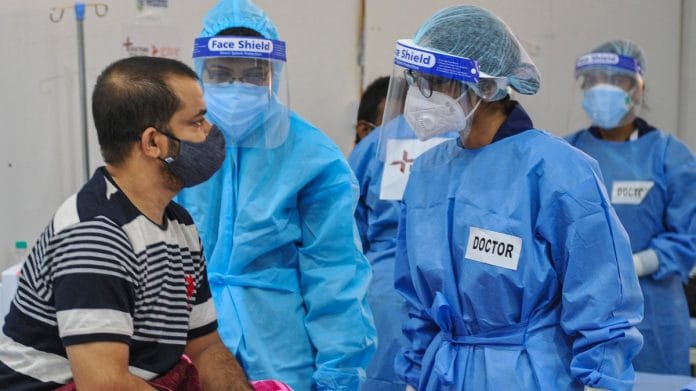There’s a lot at stake in the quest to understand so-called long Covid. It may come as a surprise to some, but lingering post-infection symptoms don’t only happen with SARS-CoV-2. And what we’re learning from studies of Covid long-haulers might eventually help us understand other diseases, from chronic fatigue syndrome to cancer to Alzheimer’s.
“What we’re seeing in Covid isn’t really exactly new,” said epidemiologist Zihad Al-Aly, who is studying long Covid at the Veterans Affairs St. Louis Health Care System. “There are a lot of other viruses that produce long-term manifestations.”
Before Covid came along, many previously healthy people developed debilitating symptoms or extreme exhaustion following viral infections. Such post-viral syndromes were inherently difficult to study, said NIH director of clinical neurology Avindra Nath. Many patients wouldn’t realize there was something wrong for some time after the initial infection, since it’s normal to feel wiped out for a couple of weeks of being sick.
It isn’t yet clear which viruses are likely to cause chronic symptoms or which kinds of people are most at risk from them. Often lumped together as chronic fatigue syndrome, even the numbers are hard to pin down — an Institute of Medicine estimate ranges from 800,000 to 2.5 million cases in the U.S.
About 75% are thought to have been triggered by a viral or bacterial infection, according to an article in the Washington Post by two people who have lived for years with the condition. One of them, Brian Vastag, had been a science reporter for the Washington Post before his illness, which started with a sudden fever in 2012.
At least now, with long Covid, researchers know which virus has caused the problem. Al-Aly says he hopes what they learn from Covid long-haulers helps them understand chronic fatigue syndrome as well. And he hopes it will help change the way the medical establishment views all post-viral syndromes. “Because we don’t fully understand it yet, there’s a tendency by some in the medical establishment to disregard this as all in people’s heads.”
The experts say between 10% to 30% of those infected with Covid will have some lingering problems. Many people who develop very severe Covid and survive after being in the ICU suffer damage to the heart, lungs, liver and blood vessels that can cause on-going symptoms.
Then there’s the separate group of relatively young people — most often people in their late 30s to early 40s and more often women than men — who initially have mild cases of Covid but then go on to develop chronic fatigue and other symptoms that can stretch on for months. Some symptoms might even be permanent.
Both kinds of cases are important. People who survived Covid-19 are 59% more likely to die within the following six months than people who were never infected, according to a study led by Al-Aly, which was published in April in the journal Nature, and detailed in this Bloomberg News story.
While there are a lot of unknowns here, what is known is that some people do get better on their own, says NIH’s Nath. A few improved after getting the Covid-19 vaccines, he says, though many have relapsed since then. The ones who’ve had symptoms for more than six months are the least likely to recover.
Nath says that rather than ordinary fatigue, many people with long Covid suffer from an extreme form of exercise intolerance, where even moderate exertion can deplete them for days. Others have lingering gastrointestinal problems, brain fog, chronic pain, anxiety and depression.
At the NIH, he’s testing people reporting these post-viral symptoms — with physiological tests as well as brain scans — and preparing to start clinical trials on drugs that might help them.
What causes long Covid?
There are a couple of hypotheses for what causes long Covid. One is the possibility that the virus never really disappears from the body, but finds somewhere to hide. That can happen with other viruses — herpes viruses are a well-known example. The other possibility is that the immune system becomes imbalanced and attacks the body’s own tissues.
Last week, researchers published a study aimed at assessing the magnitude of the problem by analyzing electronic health records. They determined that 23% of people who had recovered from Covid-19 went to the doctor for new medical conditions.
The problem with that study is that there’s no control group — we don’t know how many people generally would have sought medical treatment during this time. More people may be visiting doctors now because so many “elective” medical visits were cancelled during the height of the pandemic, and fear made people reluctant to seek medical care even signs of heart attacks and strokes.
Al-Aly said that his Nature paper did use control groups – comparing people post-Covid with people who hadn’t been infected as well as people who had been sick with influenza. Those studies revealed that Covid-19 infections were much more likely than flu to be associated with health problems — even death — weeks and months later.
In the past, infectious diseases were considered something separate from chronic diseases such as cancer and Alzheimer’s disease. But the distinctions have been falling. Cervical cancer is triggered by a virus, and a theory connecting infections to Alzheimer’s disease is gaining traction. Post-viral syndromes fell through the crack in the middle, but that’s rightly starting to change.— Bloomberg
Also read: What is ‘Long Covid’ and why some patients who have recovered continue to feel ill for months






